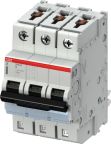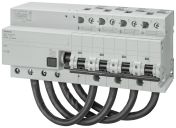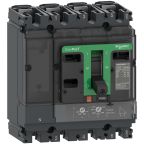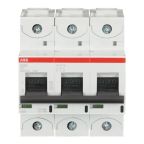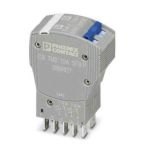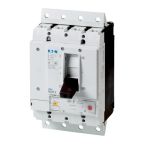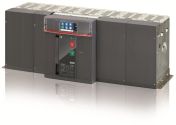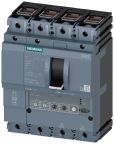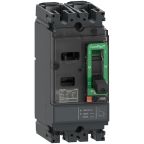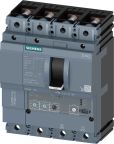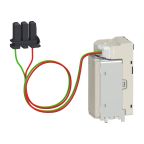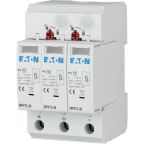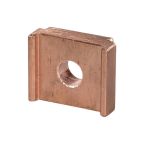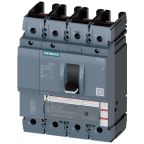Having an effective and well-designed circuit protection system in every building is vital. It not only protects machinery and equipment from costly damage or even worse an electrical fire, but good circuit protection also ensures people are safe too.
Here, at RS we stock an extensive range of high-quality products within our circuit breaker range. They include various types of protection devices as well as consumer units, distribution boards and accessories. Whether you are designing and building a new system or maintaining an old one we have everything you need, providing the perfect end-to-end solution.
Types of Circuit Breakers
Circuit breakers come in various types, each designed to protect against specific electrical faults, ensuring the safety of both people and equipment.
- RCBO Breakers: RCBO stands for Residual Current Circuit Breaker with Over Current protection. Installed in consumer units they protect from short circuits, overload current and residual current as they combine all the functions of an MCB and an RCCB.
- RCCB Breakers: RCCB stands for Residual Current Circuit Breaker. They are designed to quickly disconnect any circuit as soon as current leaks to the earthing wire. RCCBs are also effective in protecting from electrocution or shock from direct contact.
- MCB Breakers: MCB stands for Miniature Circuit Breaker. They are designed to protect an electric circuit from overcurrent only. They do not safeguard people from electric shock caused by earth leakage.
- MCCB Breakers: MCCB stands for Moulded Case Circuit Breaker. They are another type of electrical protection device used in higher current rating applications where an MCB would not suffice. An MCCB protects against overload and short circuit faults. With its high breaking capacity and a wider range of current ratings, MCCBs are typically found in industrial systems rather than domestic systems.
- Thermal Breakers: Thermal breakers utilise a bimetallic strip that bends when heated by excessive current, triggering the circuit to open. They are commonly used in appliances and small electronics for basic overload protection.
- Electronic Circuit Breakers: Electronic circuit breakers offer advanced protection features and precise control. They use electronic components to monitor current and voltage, providing adjustable trip settings and remote operation capabilities.
Selecting the Right Circuit Breaker for Your Project
Selecting the correct circuit breaker is crucial for ensuring the safety and functionality of your electrical system. Making an informed choice prevents potential hazards and ensures optimal protection. Here are some key selection criteria and best practices:
- Current Rating: The circuit breaker's current rating must match or slightly exceed the maximum expected current in the circuit. An undersized breaker risks tripping during normal operation, while an oversized one may not provide adequate protection in a fault condition.
- Voltage Rating: Ensure the circuit breaker's voltage rating corresponds to the system's voltage level. Using a breaker with an inadequate voltage rating can lead to catastrophic failure and pose a safety hazard.
- Number of Poles: The number of poles determines the number of conductors the breaker can protect. Single-pole breakers are used for single-phase circuits, while two-pole and three-pole breakers are employed in multi-phase systems. Choosing the wrong number of poles can lead to inadequate protection or unnecessary complexity.
- Trip Curve: Different circuit breakers have different trip curves, which define how quickly they trip in response to overcurrents. Select a trip curve suitable for the connected load and the desired level of protection.
- Interrupting Capacity: The interrupting capacity indicates the maximum fault current the breaker can safely interrupt. Ensure the breaker's interrupting capacity exceeds the potential short-circuit current at its installation point.
- Application: Choose the appropriate circuit breaker type for your application. For instance, use an RCCB for protection against earth leakage and electric shock, an MCB for general overcurrent protection, or an MCCB for high-current industrial applications.
- Environmental Conditions: Consider the environment where the circuit breaker will be installed. Select a breaker with suitable ingress protection (IP) rating if it will be exposed to dust, moisture, or other contaminants.
- Standards and Certifications: Always choose circuit breakers that comply with relevant safety standards and certifications, ensuring they meet the required quality and performance levels.
Industrial Applications for Circuit Breakers
Circuit breakers play a crucial role in safeguarding industrial electrical systems, preventing equipment damage and ensuring personnel safety. Their ability to quickly interrupt fault currents makes them indispensable across a variety of sectors. Let's delve into some key industrial applications:
- Power Generation and Transmission: High-voltage circuit breakers (power breakers) protect power plants, substations, and transmission lines from overloads and short circuits, maintaining the stability of the power grid.
- Manufacturing: Industrial circuit breakers, including MCCBs, safeguard critical machinery and equipment in manufacturing plants, minimising downtime and ensuring continuous production.
- Oil and Gas: Hazardous environments like oil rigs and refineries demand robust electrical protection. Explosion-proof circuit breakers are crucial for preventing electrical sparks and fires.
- Mining: Mining operations face harsh conditions and potential electrical faults. Rugged circuit breakers designed for extreme environments ensure safety and uninterrupted power supply to mining equipment.
- Chemical and Petrochemical: The chemical and petrochemical industries handle volatile substances, necessitating electrical safety measures. Specialised circuit breakers protect against potential explosions and ensure safe operations.
- Data Centers: Data centers rely on a continuous and reliable power supply. Circuit breakers, often with remote monitoring and control features, safeguard critical IT infrastructure and prevent data loss.
Your Trusted Circuit Breaker Supplier & Manufacturer in Singapore
RS is your reliable partner for all your circuit breaker needs. We are a leading circuit breaker supplier and manufacturer, offering a wide selection of high-quality electrical circuit breakers from trusted brands. Whether you require industrial circuit breakers for demanding applications or miniature circuit breakers for residential use, we have a solution to safeguard your electrical systems. For detailed information on our delivery options, including estimated timelines and fees, please visit ourDelivery Information Page.
















